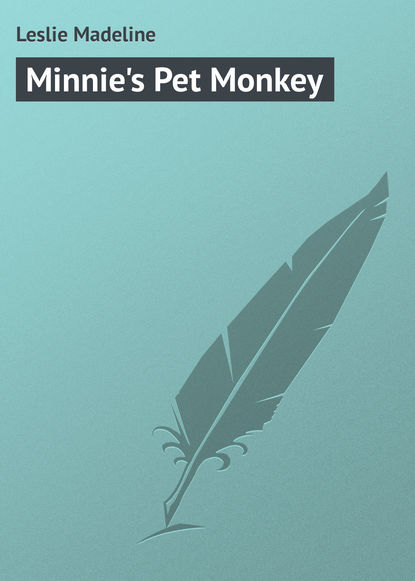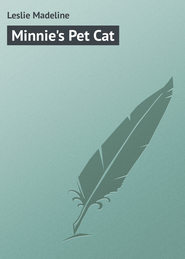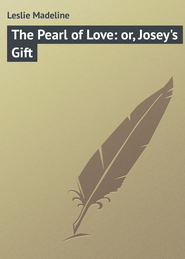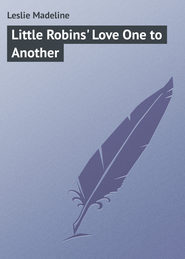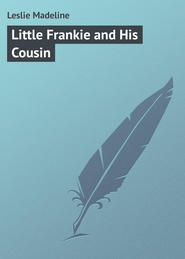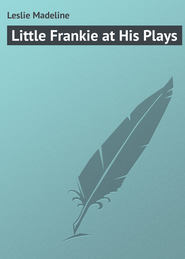По всем вопросам обращайтесь на: info@litportal.ru
(©) 2003-2025.
✖
Minnie's Pet Monkey
Настройки чтения
Размер шрифта
Высота строк
Поля
Minnie's Pet Monkey
Madeline Leslie
Leslie Madeline
Minnie's Pet Monkey
CHAPTER I.
JACKO AND HIS WOUNDED TAIL
Did you ever see a monkey? If you have not, I suppose you will like to hear a description of Jacko, Minnie’s sixth pet.
He was about eighteen inches high, with long arms, covered with short hair, which he used as handily as a boy, flexible fingers, with flat nails, and a long tail, covered with hair, which seemed to answer the purpose of a third hand.
Though monkeys are usually very ugly and unpleasant, from their approaching so nearly to the human face, and still bearing so strongly the marks of the mere brute, yet Jacko was a pretty little fellow.
He had bright eyes, which sparkled like diamonds from beneath his deep-set eyebrows. His teeth were of the most pearly whiteness, and he made a constant display of them, grinning and chattering continually. But I ought to tell you about his passage in uncle Frank’s ship.
On one of Captain Lee’s voyages, he touched upon the coast of Africa, where he saw the little fellow in a hen-coop, just about to be carried on board a whaler. The gentleman had often thought he should like to carry his favorite niece a little pet; but as she already had a parrot, he did not know what she would wish.
But when he listened to the chattering of the monkey, and heard the sailor who owned him say what a funny little animal it was, he thought he would buy it and take it home to her.
On the voyage, Jacko met with a sad accident. The hen-coop in which he was confined was too small to contain the whole of his tail, and he was obliged, when he slept, to let the end of it hang out. This was a great affliction to the poor animal, for he was very proud of his tail, which was indeed quite an addition to his good looks.
It so happened that there were two large cats on board ship; and one night, as they were prowling about, they saw the tail hanging out while Jacko was sound asleep; and before he had time to move, one of them seized it and bit it off.
The monkey was very indignant, and if he could have had a fair chance at his enemies, would have soon punished them for their impudence. It was really amusing to see him afterward. He would pull his bleeding tail in through the bars of the hen-coop, and give it a malicious bite, as much as to say, —
“I wish you were off. You are of no use to me now; and you look terribly short.”
When they reached New York, at the end of their voyage, Captain Lee took Jacko out of the hen-coop, and put him in a bag, which was carried into the depot while he was purchasing his ticket. The monkey, who must needs see every thing that was going on, suddenly poked his head out of the bag, and gave a malicious grin at the ticket-master.
The man was much frightened, but presently recovered himself, and returned the insult by saying, —
“Sir, that’s a dog! It’s the rule that no dog can go in the cars without being paid for.”
It was all in vain that the captain tried to convince him that Jacko was not a dog, but a monkey. He even took him out of the bag; but in the face of this evidence, the man would persist in saying, —
“He is a dog, and must have a ticket before he enters the cars.”
So a ticket was bought, and Jacko was allowed to proceed on his journey.
The little fellow was as pleased as the captain when he arrived at the end of his journey, and took possession of his pleasant quarters in the shed adjoining Mr. Lee’s fine house. He soon grew fond of his little mistress, and played all manner of tricks, jumping up and down, swinging with his tail, which had begun to heal, and chattering with all his might in his efforts to please her.
Mr. Lee, at the suggestion of his brother, the captain, had a nice house or cage made for Minnie’s new pet, into which he could be put if he became troublesome, and where he always went to sleep. The rest of the time he was allowed his liberty, as far as his chain would reach.
Jacko came from a very warm climate, and therefore often suffered from the cold in the northern latitude to which he had been brought.
Mrs. Lee could not endure to see a monkey dressed like a man, as they sometimes are in shows. She said they looked disgustingly; but she consented that the little fellow should have a tight red jacket, and some drawers, to keep him comfortable. Minnie, too, begged from her some old pieces of carpeting, to make him a bed, when Jacko seemed greatly delighted. He did not now, as before, often stand in the morning shaking, and blue with the cold, but laughed, and chattered, and showed his gratitude in every possible way.
Not many months after Jacko came, and when he had become well acquainted with all the family, Fidelle had a family of kittens, which she often carried in her mouth back and forth through the shed. The very sight of these little animals seemed to excite Jacko exceedingly. He would spring the entire length of his chain, trying to reach them.
One day, when the kittens had begun to run alone, and were getting to be very playful, the cook heard a great noise in the shed, and Fidelle crying with all her might. She ran to see what was the matter, and, to her surprise, found Jacko sitting up in the cage, grinning with delight, while he held one of the kittens in his arms, hugging it as if it had been a baby.
Cook knew the sight would please Minnie, and she ran to call her. But the child sympathized too deeply in Fidelle’s distress to enjoy it. She tried to get the kitten away from Jacko, but he had no idea of giving it up, until at last, when Mrs. Lee, who had come to the rescue, gave him a piece of cake, of which he was very fond, he relaxed his hold, and she instantly released the poor, frightened little animal.
Fidelle took warning by this occurrence, and never ventured through the shed again with her babies, though Jacko might seem to be sound asleep in his cage.
Jacko had been at Mr. Lee’s more than a year before they knew him to break his chain and run about by himself. The first visit he made was to Leo, in the barn, and he liked it so well that, somehow or other, he contrived to repeat the visit quite as often as it was agreeable to the dog, who never could endure him.
After this, he became very mischievous, so that every one of the servants, though they often had a great laugh at his tricks, would have been glad to have the little fellow carried back to his home in Africa.
I don’t think even Minnie loved her pet monkey as well as she did her other pets. She could not take him in her arms as she did Fidelle and Tiney, nor play with him as she did with Nannie and her lamb, and he could not carry her on his back, as Star did.
“Well,” she said, one day, after discussing the merits of her animals with her mamma, “Poll talks to me, and Jacko makes me laugh; but if I should have to give up one of my pets, I had rather it would be the monkey.”
CHAPTER II.
JACKO BLACKING THE TABLE
One morning, cook went to her mistress with loud complaints of Jacko’s tricks.
“What has he been doing now?” inquired the lady, with some anxiety.
“All kinds of mischief, ma’am. If I didn’t like you, and the master, and Miss Minnie so well, I wouldn’t be living in the same house with a monkey, no ways.”
Here the woman, having relieved her mind, began to relate Jacko’s new offence, and soon was joining heartily in the laugh her story caused her mistress.
“Since the trickish fellow found the way to undo his chain, ma’am, he watches every thing that is done in the kitchen. Yesterday I polished the range, and the door to the oven. I suppose he saw me at work, and thought it would be good fun; for when I was out of the kitchen hanging some towels to dry on the line, in he walks to the closet where I keep the blacking and brushes, and what should he do but black the table and chairs? Such a sight, ma’am, as would make your eyes cry to see. It’ll take me half the forenoon to clean them.”
“I think you will have to take a little stick, Hepsy,” said Mrs. Lee, smiling, “and whip him when he does mischief.”
“Indeed, ma’am, and it’s little strength I’d have left me to do the cooking if I gave him half the whippings he deserves; besides, I’d be sure to get the cratur’s ill will; and they say that’s unlucky for any one.”
“What does she mean, mamma, by its being unlucky?” inquired Minnie, when the cook had returned to her work in the kitchen.
“I can’t say, my dear. You know Hepsy has some strange ideas which she brought with her from Ireland. It may be she has heard of the superstitious reverence some nations have for the monkey.”
“O, mamma, will you please tell me about it?”
“I have read that in many parts of India, monkeys are made objects of worship; and splendid temples are dedicated to their honor.
“At one time, when the Portuguese plundered the Island of Ceylon, they found, in one of the temples dedicated to these animals, a small golden casket containing the tooth of a monkey. This was held in such estimation by the natives, that they offered nearly a million of dollars to redeem it. But the viceroy, thinking it would be a salutary punishment to them, ordered it to be burned.
“Some years after, a Portuguese, having obtained a similar tooth, pretended that he had recovered the old one, which so rejoiced the priests that they purchased it from him for more than fifty thousand dollars.”
Minnie laughed. “I should suppose,” she said, “that if cook thinks so much of monkeys, she would be pleased to live with them. Do you know any more about monkeys, mamma?”
“I confess, my dear, that monkeys have never been among my favorites. There are a great many kinds, but all are mischievous, troublesome, and thievish. The dispositions of some of them are extremely bad, while others are so mild and tractable as to be readily tamed and taught a great variety of tricks. They live together in large groups, leaping with surprising agility from tree to tree. Travellers say it is very amusing to listen to the chattering of these animals, which they compare to the shouting of a grand cavalcade, all speaking together, and yet seeming perfectly to understand one another.
Madeline Leslie
Leslie Madeline
Minnie's Pet Monkey
CHAPTER I.
JACKO AND HIS WOUNDED TAIL
Did you ever see a monkey? If you have not, I suppose you will like to hear a description of Jacko, Minnie’s sixth pet.
He was about eighteen inches high, with long arms, covered with short hair, which he used as handily as a boy, flexible fingers, with flat nails, and a long tail, covered with hair, which seemed to answer the purpose of a third hand.
Though monkeys are usually very ugly and unpleasant, from their approaching so nearly to the human face, and still bearing so strongly the marks of the mere brute, yet Jacko was a pretty little fellow.
He had bright eyes, which sparkled like diamonds from beneath his deep-set eyebrows. His teeth were of the most pearly whiteness, and he made a constant display of them, grinning and chattering continually. But I ought to tell you about his passage in uncle Frank’s ship.
On one of Captain Lee’s voyages, he touched upon the coast of Africa, where he saw the little fellow in a hen-coop, just about to be carried on board a whaler. The gentleman had often thought he should like to carry his favorite niece a little pet; but as she already had a parrot, he did not know what she would wish.
But when he listened to the chattering of the monkey, and heard the sailor who owned him say what a funny little animal it was, he thought he would buy it and take it home to her.
On the voyage, Jacko met with a sad accident. The hen-coop in which he was confined was too small to contain the whole of his tail, and he was obliged, when he slept, to let the end of it hang out. This was a great affliction to the poor animal, for he was very proud of his tail, which was indeed quite an addition to his good looks.
It so happened that there were two large cats on board ship; and one night, as they were prowling about, they saw the tail hanging out while Jacko was sound asleep; and before he had time to move, one of them seized it and bit it off.
The monkey was very indignant, and if he could have had a fair chance at his enemies, would have soon punished them for their impudence. It was really amusing to see him afterward. He would pull his bleeding tail in through the bars of the hen-coop, and give it a malicious bite, as much as to say, —
“I wish you were off. You are of no use to me now; and you look terribly short.”
When they reached New York, at the end of their voyage, Captain Lee took Jacko out of the hen-coop, and put him in a bag, which was carried into the depot while he was purchasing his ticket. The monkey, who must needs see every thing that was going on, suddenly poked his head out of the bag, and gave a malicious grin at the ticket-master.
The man was much frightened, but presently recovered himself, and returned the insult by saying, —
“Sir, that’s a dog! It’s the rule that no dog can go in the cars without being paid for.”
It was all in vain that the captain tried to convince him that Jacko was not a dog, but a monkey. He even took him out of the bag; but in the face of this evidence, the man would persist in saying, —
“He is a dog, and must have a ticket before he enters the cars.”
So a ticket was bought, and Jacko was allowed to proceed on his journey.
The little fellow was as pleased as the captain when he arrived at the end of his journey, and took possession of his pleasant quarters in the shed adjoining Mr. Lee’s fine house. He soon grew fond of his little mistress, and played all manner of tricks, jumping up and down, swinging with his tail, which had begun to heal, and chattering with all his might in his efforts to please her.
Mr. Lee, at the suggestion of his brother, the captain, had a nice house or cage made for Minnie’s new pet, into which he could be put if he became troublesome, and where he always went to sleep. The rest of the time he was allowed his liberty, as far as his chain would reach.
Jacko came from a very warm climate, and therefore often suffered from the cold in the northern latitude to which he had been brought.
Mrs. Lee could not endure to see a monkey dressed like a man, as they sometimes are in shows. She said they looked disgustingly; but she consented that the little fellow should have a tight red jacket, and some drawers, to keep him comfortable. Minnie, too, begged from her some old pieces of carpeting, to make him a bed, when Jacko seemed greatly delighted. He did not now, as before, often stand in the morning shaking, and blue with the cold, but laughed, and chattered, and showed his gratitude in every possible way.
Not many months after Jacko came, and when he had become well acquainted with all the family, Fidelle had a family of kittens, which she often carried in her mouth back and forth through the shed. The very sight of these little animals seemed to excite Jacko exceedingly. He would spring the entire length of his chain, trying to reach them.
One day, when the kittens had begun to run alone, and were getting to be very playful, the cook heard a great noise in the shed, and Fidelle crying with all her might. She ran to see what was the matter, and, to her surprise, found Jacko sitting up in the cage, grinning with delight, while he held one of the kittens in his arms, hugging it as if it had been a baby.
Cook knew the sight would please Minnie, and she ran to call her. But the child sympathized too deeply in Fidelle’s distress to enjoy it. She tried to get the kitten away from Jacko, but he had no idea of giving it up, until at last, when Mrs. Lee, who had come to the rescue, gave him a piece of cake, of which he was very fond, he relaxed his hold, and she instantly released the poor, frightened little animal.
Fidelle took warning by this occurrence, and never ventured through the shed again with her babies, though Jacko might seem to be sound asleep in his cage.
Jacko had been at Mr. Lee’s more than a year before they knew him to break his chain and run about by himself. The first visit he made was to Leo, in the barn, and he liked it so well that, somehow or other, he contrived to repeat the visit quite as often as it was agreeable to the dog, who never could endure him.
After this, he became very mischievous, so that every one of the servants, though they often had a great laugh at his tricks, would have been glad to have the little fellow carried back to his home in Africa.
I don’t think even Minnie loved her pet monkey as well as she did her other pets. She could not take him in her arms as she did Fidelle and Tiney, nor play with him as she did with Nannie and her lamb, and he could not carry her on his back, as Star did.
“Well,” she said, one day, after discussing the merits of her animals with her mamma, “Poll talks to me, and Jacko makes me laugh; but if I should have to give up one of my pets, I had rather it would be the monkey.”
CHAPTER II.
JACKO BLACKING THE TABLE
One morning, cook went to her mistress with loud complaints of Jacko’s tricks.
“What has he been doing now?” inquired the lady, with some anxiety.
“All kinds of mischief, ma’am. If I didn’t like you, and the master, and Miss Minnie so well, I wouldn’t be living in the same house with a monkey, no ways.”
Here the woman, having relieved her mind, began to relate Jacko’s new offence, and soon was joining heartily in the laugh her story caused her mistress.
“Since the trickish fellow found the way to undo his chain, ma’am, he watches every thing that is done in the kitchen. Yesterday I polished the range, and the door to the oven. I suppose he saw me at work, and thought it would be good fun; for when I was out of the kitchen hanging some towels to dry on the line, in he walks to the closet where I keep the blacking and brushes, and what should he do but black the table and chairs? Such a sight, ma’am, as would make your eyes cry to see. It’ll take me half the forenoon to clean them.”
“I think you will have to take a little stick, Hepsy,” said Mrs. Lee, smiling, “and whip him when he does mischief.”
“Indeed, ma’am, and it’s little strength I’d have left me to do the cooking if I gave him half the whippings he deserves; besides, I’d be sure to get the cratur’s ill will; and they say that’s unlucky for any one.”
“What does she mean, mamma, by its being unlucky?” inquired Minnie, when the cook had returned to her work in the kitchen.
“I can’t say, my dear. You know Hepsy has some strange ideas which she brought with her from Ireland. It may be she has heard of the superstitious reverence some nations have for the monkey.”
“O, mamma, will you please tell me about it?”
“I have read that in many parts of India, monkeys are made objects of worship; and splendid temples are dedicated to their honor.
“At one time, when the Portuguese plundered the Island of Ceylon, they found, in one of the temples dedicated to these animals, a small golden casket containing the tooth of a monkey. This was held in such estimation by the natives, that they offered nearly a million of dollars to redeem it. But the viceroy, thinking it would be a salutary punishment to them, ordered it to be burned.
“Some years after, a Portuguese, having obtained a similar tooth, pretended that he had recovered the old one, which so rejoiced the priests that they purchased it from him for more than fifty thousand dollars.”
Minnie laughed. “I should suppose,” she said, “that if cook thinks so much of monkeys, she would be pleased to live with them. Do you know any more about monkeys, mamma?”
“I confess, my dear, that monkeys have never been among my favorites. There are a great many kinds, but all are mischievous, troublesome, and thievish. The dispositions of some of them are extremely bad, while others are so mild and tractable as to be readily tamed and taught a great variety of tricks. They live together in large groups, leaping with surprising agility from tree to tree. Travellers say it is very amusing to listen to the chattering of these animals, which they compare to the shouting of a grand cavalcade, all speaking together, and yet seeming perfectly to understand one another.





